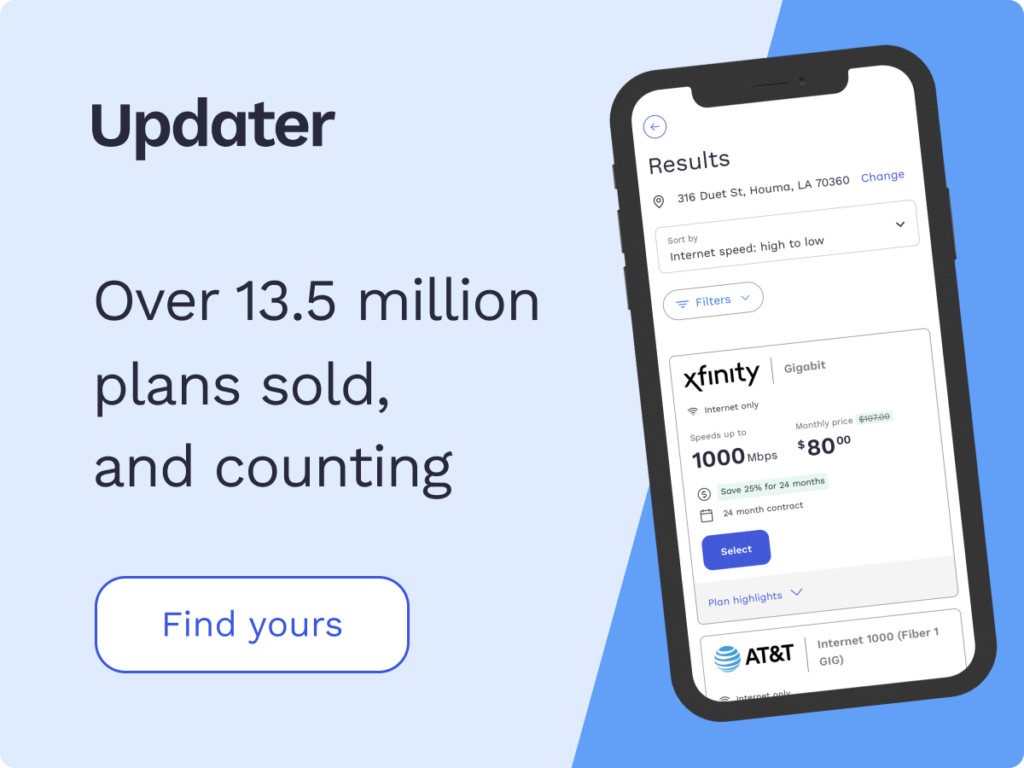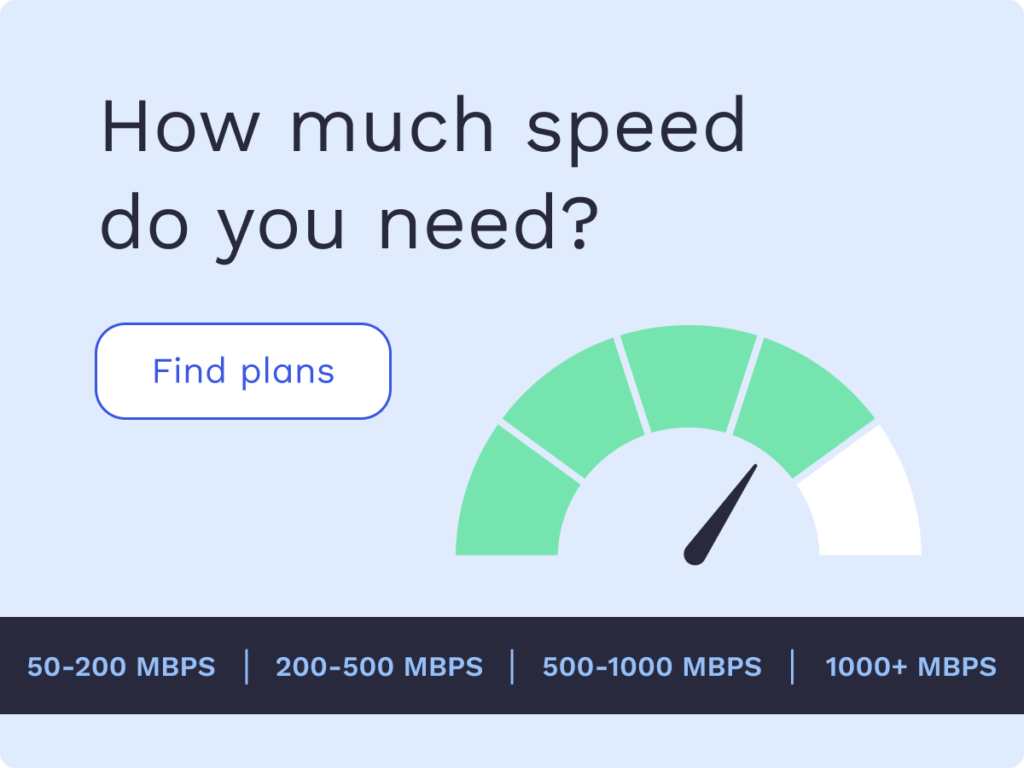A Guide to Internet and TV Service for Renters

Whether you’re renting while saving for a home or because apartment living is just a better fit for your lifestyle, choosing internet and TV service often requires research.
Even if you’re lucky enough to find an apartment complex that provides internet and TV options as part of your rental agreement, there are still a lot of questions to ask before signing on the dotted line. And if internet and TV options are not included among the amenities of your new place, there are even more things to consider before making a decision.
Not sure where to start? No worries, we’ve got you covered. We’ve gathered the important questions to consider if your next apartment offers internet and TV or if they don’t, as well as a rundown of top provider plans that you may want to consider.
- Questions to ask if internet and TV are included
- Questions to ask if internet and TV are not included amenities
- Choosing an ISP
Questions to ask if internet & TV are included
If the apartment complex you’re considering for your next move offers internet and TV services as amenities, this might seem like a no-brainer at first. With the rising cost of rent, the more free amenities, the better, right? Well, not exactly. There are definitely a few key points to consider before signing your lease agreement.
Who is the service provider?
Finding out who the provider is for the internet and TV service will help you better understand what type of plans that company typically offers. You’ll also need to learn about price points and what kind of customer service you can expect.
What type of connection is provided?
Is the complex a newer building that might have state-of-the-art fiber connections so you can expect faster speeds and a more reliable connection? Or is the building older and still relying on a cable connection, or even slower DSL?
Is the TV service through a standard cable connection that requires a cable box, or is it delivered through the internet or satellite? Streaming TV services that use internet connections will not work if your internet goes down for any reason, and satellite service can go out in bad weather.
Gaining an understanding of the type of connection you’ll have for both internet and TV will help you set expectations for overall service.
How much internet speed and/or how many channels are included?
Determining how much internet speed you need versus how much is included with your rent is important. Homes with average internet usage like surfing the web, answering emails, and occasional movie watching will function just fine with internet speeds around 10Mbps. But for households with heavy usage like multiple devices streaming 4K movies at once, video-conferencing and online gaming, anything less than 100Mbps won’t cover your needs.
You’ll also need to take a close look at the TV service provided. If you have a movie or sports lover in the home but the service doesn’t include regional sports, or popular movie channels, you might find that you have to spend more out of pocket on other services to get what you want.
Can you upgrade your service?
If you determine that the internet and TV plans being offered as an amenity are not going to fit your speed or channel needs, the next question to ask is whether you are allowed to upgrade the service. Can you choose a higher speed package for internet? Can you add premium channels for TV? And if so, what will the additional cost be? If not, what alternatives are available?
Are deposits or extra fees required?
Many internet service providers (ISPs) and TV service providers require a deposit for certain income situations as well as installation fees and monthly equipment rental fees. Find out what additional fees might be required upfront based on your situation as well as if you will be responsible for extra fees for equipment rental or regional sports surcharges.
Is using the included internet/TV required or can you opt-out and choose your own?
Although the apartment complex may be offering internet and TV service as a bonus amenity, you may prefer other options. If the offerings don’t fit your household’s needs or you’d rather choose your own service, you should find out if you can opt-out and save money on your monthly rent. You’ll also need to learn if opting out can help reduce your rent so that you don’t end up double-paying for internet and TV, which is definitely not ideal.
Questions to ask if internet & TV are not included
How much internet speed do you need?
Determining the right amount of speed for each household is a question that leaves many scratching their heads. If you have existing internet service that meets your needs, you can approach this question by doing a speed test on your current connection. Once you know how much speed you currently have, you can decide if you feel like it’s enough, or you need more.
In general, homes that use the internet for casual web surfing, social media, emails, and movie watching will be just fine with internet speeds of 50Mbps or less. Households with heavier usage such as work from home video conferencing, multiple devices streaming at once, and online gaming need at least 100Mbps and might consider speeds up to 500Mbps. Households with heavy usage that includes connected smart home devices, multiple online gamers, and multiple devices streaming high-definition movies at once will likely want speeds of 500Mbps or more.
Many ISPs these days do not require long-term contracts so it’s possible that you may be able to upgrade or downgrade your speed packages without penalty should you find that the first plan you choose isn’t what you want or need.
Who are the available providers in the area?
Another important step in choosing an ISP and/or TV provider is determining what options will be available at your new address. Once you know who the providers are, you can begin comparing plans to figure out which one will be the best fit for your needs.
What contract terms are required?
Although according to a recent survey the average tenant lives in an apartment for three years, your plans might be different. For this reason, it’s good to have a general idea of how long you’re planning on staying in one place if the ISPs and TV services you’re considering require a contract.
Moving is stressful enough without having to worry about cancellation fees because your next move happens before your internet or TV contract expires. Of course, you may be able to avoid fees if you can take the service(s) with you on your next move, but that’s not always an option.
How big is the provider’s service footprint?
Determining how big a service provider’s footprint is can be a very important piece of information for this move, as well as future moves. If the company is a small regional provider and you know you’ll be moving out of its range with your next move, this means you’ll have to go through the hassle of choosing a new provider all over again. On the other hand, if the provider has a larger footprint and you’re fairly sure it’ll be available wherever your next move is, this means you’ll have fewer things to worry about for a future move.
Are there any additional fees to consider?
While most providers are clear with their introductory rates, additional fees and costs are typically not as clear. A low monthly rate might look great at first, but make sure you dig into the details.
Common fees for internet and TV service include:
- Deposit
- Installation fee
- Start-up/activation fee
- Monthly equipment rental fee
- DVR service (or upgrades)
- Regional sports fee
- Local TV fee
- Early termination fee (if a contract is required)
If the monthly cost is an introductory rate, consider asking how long that rate will last and what you might expect the increase to be at the end of the introductory offer.
Choosing an ISP
Ready to dig into the details of some common internet and TV providers? Each of the following providers offers both internet and TV service, has a large national footprint, and offers multiple packages to choose from.
AT&T
AT&T is arguably one of the most affordable options for internet service. If you live in an area where you can access their fiber network, you’ll be able to take advantage of their lightning fast speeds. AT&T internet plans range from $55/month for 300Mbps to $180 a month for up to 5Gbps (where available), require no contract and the prices also include equipment fees.
If you’d like to add TV options, DIRECTV STREAM offers four package options which range from $69.99/month for 65+ channels to $149.99/month for 140+ and all plans include thousands of on-demand movies and shows.
Xfinity
Xfinity offers a large variety of internet and TV bundles which vary according to where you live but definitely give you enough variability to find a great fit for your needs. Plans generally start from $49.99/month for 100Mbps of internet and 10+ local channels and go all the way up to $125/month for 1200Mbps of speed and 185+ channels.
These plans do require at least a 12-month agreement but the price is locked in for 24 months and if you’re an Xfinity mobile customer, you’ll get an additional $10/month discount on your bill.
Spectrum
Spectrum offers three internet plan options which range from a starting price of $49.99/month for 200Mbps to $89.99/month for 1Gbps. For TV, Spectrum’s most popular package starts at $49.99/month for 125+ channels and 85,000 on-demand titles. The most popular internet and TV bundle from Spectrum is definitely well-priced. It starts at $49.99/month and includes 200Mbps of internet as well as 125+ channels and 85,000 on-demand titles—which essentially means you are buying TV and getting your internet for free.
Cox
Last, but certainly not least, Cox offers a variety of internet and TV options for you to choose from as well as the ability to customize your package. Cox offers three TV packages which start at $53/month for 75+ local channels and go up to $138/month for all of their available channels including premium movie channels, regional sports, entertainment, and more. DVR service is extra.
Cox internet speeds range from 25 to 1000Mbps, and you can expect to pay between $29.99/month and $99.99/month depending on which speed tier you ultimately decide on.
*Pricing varies by location and availability. Speeds may vary. All prices subject to change; for current pricing and availability visit our internet service page. Prices as of 5/25/22.
Disclosure | Updater articles are based on our own data and research, independent from partner relationships. We are not compensated by partners for information and opinions presented here. Our Editorial Terms of Service can be found here.














